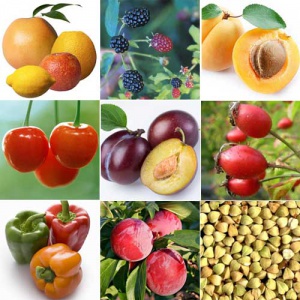Bioflavonoids
Description
Bioflavonoids, also known as vitamin P, are water-soluble and composed of a group of brightly colored substances that often appear in fruits and vegetables. These substances are commonly companions of vitamin C. The components of the bioflavonoids are citrin, hesperidin, eriodictyol, quercetin, rutin, flavones and flavonals.
This vitamin was first discovered as a substance in the white fleshy segments of citrus fruits. There's ten times the concentration of bioflavonoids in the the edible part of the fruit than there is in the juice.
Uses
Bioflavonoids are essential in the body for the proper absorption and utilization of vitamin C. They assist vitamin C in maintaining collagen, the intercellular cement, in healthy condition. They increase the strength of the capillaries, and help to prevent hemorrhages and ruptures, while also building a protective barrier against infection.
Vitamin P (bioflavonoids) cannot be manufactured by the body, therefore must be supplemented in the diet. There are over 800 different bioflavonoids currently known. Some medicinal values are that they lower blood pressure, can retard tumor growth, and can help in the treatment of phlebitis and other blood-clotting disorders.
Rutin, which is contained in bioflavonoids, is especially helpful in the prevention of recurring bleeding arising from weakened blood vessels. It is successfully used in the treatment of hemorrhoids, and bleeding in the eye (retina) due to hypertension or diabetes.
Bioflavonoids have been used successfully to treat ulcer patients, and those suffering from dizziness due to inner ear problems. They can also lessen pain in rheumatoid arthritis sufferers.
Conditions
Bioflavonoids (vitamin P) may be beneficial for the following ailments:
- Arteriosclerosis
- Atherosclerosis
- Cholesterol (high level)
- Hemophilia
- Hypertension
- Leukemia
- Stroke
- Hemorrhoids
- Arthritis
- Ulcers
- Pyorrhea (gum disease)
- Common Cold
Food Sources
- Citrus fruits (white segments)
- Apricots
- Blackberries
- Buckwheat
- Parsley
- Prunes
- Peppers
- Rose hips
- Bilberry
- Burdock
- Black currants
- Cherries
- Grapefruit
- Oranges
- Lemon
- Plums
- Grapes
- Green tea
- Juniper berries
Toxicity
Bioflavonoids are completely nontoxic.
